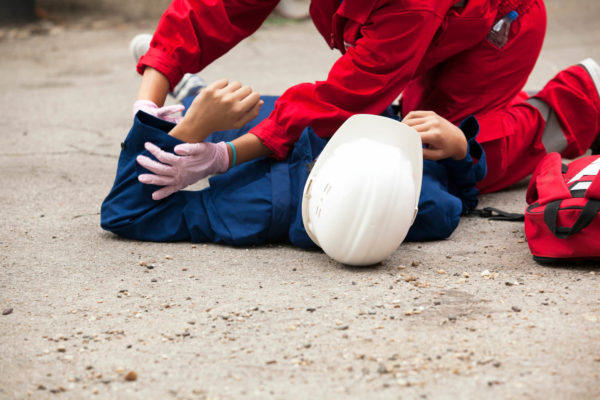Construction Accidents: How to Get Compensation

Construction sites are some of the most dangerous places to work. If you’ve been injured in a construction accident, you’re probably wondering how to get compensation. Even if you are covered by workers’ compensation insurance, it may not fully cover the expenses incurred due to your injury.
Accident lawsuits are governed by the Texas accident and injury legal process, just like workers’ compensation. Such cases are heard in a court of law where attorneys work to establish liability, since comparative negligence law can make the injured victim partially responsible for the accident.
OSHA dispenses fines against negligent companies, but these fines are not adequate for covering injured employees.
You can recover compensation, even under the comparative negligence laws, which have been modified in such a way that if the injured person is less responsible for the accident than the construction company or other employer, the victim can still receive financial compensation.
Construction Accident Law Overview
Suits seeking compensation for construction accidents can be difficult to win without experienced help from a lawyer. Most construction projects have multiple contractors and subcontractors, obscuring the issue of liability.
Also, construction accidents aren’t like other cases because construction work is considered more dangerous than different types of work. The employer has a greater responsibility to ensure the safety of its employees.
In Texas, tort reform measures passed years ago have complicated construction accident laws. The tort reforms created a two-tier system or two sets of rules that govern workers’ rights:
- Worksite injuries covered by workers’ compensation insurance
- Worksite injuries not covered by workers’ compensation insurance
Determining whether or not workers’ compensation covers the injury is the first hurdle. Your employer’s status as an insurance holder determines your rights, the type of attorney you need, and any limits or caps on compensation.
The employer’s status determines the legal strategies your attorney uses to determine your employer’s liability and the type of representation you need. Workers’ compensation insurance status also determines who can obtain compensation along with other items.
Defining Workers Compensation Insurance
Workers compensation insurance, or workers comp, is an insurance plan offered to employers to protect them from lawsuits. However, employers are not required to purchase it.
If a worker is injured on a construction site operated by a company that subscribes to workers comp insurance, the worker’s medical expenses and some salary is paid by the insurance carrier.
If a construction company does not buy workers comp insurance, it is labeled a nonsubscriber. Companies skip purchasing workers’ comp policies to save money, but it can be a false economy. Accident cases are much different from workers comp cases. They can cost a business far more than it saved by not buying a policy.
Also, the Workers Compensation Act of Texas has some teeth. There are penalties for employers who choose to be nonsubscribers. They have fewer legal defenses and no cap on recoverable compensation.
Determining Responsibility
Two parties share responsibility for a worker’s safety — the construction company and the construction worker. However, the company can be held liable for itself and its workers.
The company is legally responsible for providing a safe and productive work environment. It must maintain safe premises for both the workers and the public. Construction companies are expected to take reasonable steps to maintain safety onsite, including:
- Hiring licensed, qualified workers
- Properly training workers
- Providing required safety equipment
- Inspecting the site regularly for hazards
- Keeping equipment out of the roadway
- Warning workers and visitors of any known problems
- Posting warning signs leading up to construction zones
- Providing safe detours for drivers
If a company fails in any regard, it can be held responsible for both the accident and the workers’ behavior. In Texas, there is a legal doctrine called vicarious liability. The doctrine holds employers responsible for the negligence of their employees.
If a worker makes a mistake that ultimately leads to a construction accident or if the worker is at fault for injury or death, vicarious liability applies. If the worker is an independent contractor or subcontractor, they may be found personally liable since they are not company employees.
Contributing Factors in Construction Accident Injuries
Several factors are commonly found in construction sites that contribute to injury.
- Lack of proper safety protocol
- Inadequate employee safety training
- Lack of protective equipment
- Equipment malfunction
- Failure to maintain equipment
- Design or inspection errors
- Employee misconduct, such as drug or alcohol use
Depending on the factors involved, a construction accident injury case can have more than one defendant. For example, if equipment malfunctions, it could be laid at the door of the construction company for improper maintenance or the equipment manufacturer for building faulty equipment.
What to Do After an Accident
If you are involved in a construction accident, seek medical attention immediately. You want your injuries documented promptly, so don’t wait for symptoms to worsen before seeing a healthcare provider.
Report the injury through the proper channels. If the construction company is your employer, it is legally required to report the incident to OSHA, in which case OSHA may investigate. If you are an independent contractor or subcontractor, identify your employer if possible and notify the property owner or manager of your injury. Also, independent contractors and bystanders should notify the police to create an official report.
Every company should have procedures for handling accidents.
Document as much as possible. Take pictures and videos with your phone. Identify witnesses and obtain their contact information. Write down what happened as soon as possible, in as much detail as possible. Stick to the facts, don’t embellish or exaggerate.
Now you are ready to consult a construction accident injury attorney. Do it before talking with the at-fault party’s insurance company or before you do anything else. The insurance adjuster might try to manipulate you or get statements on record that can devalue or deny an injury claim.
An experienced accident injury attorney can manage negotiations between you, the construction company, and the insurance providers. They can help you find competent medical care and investigate the circumstances of the accident to prove who was at fault and what their liability is.
Summation
Construction accident injuries are complicated cases. If you have been injured in a construction site accident, you need someone to help you obtain the compensation you deserve and manage the various challenges you now have in your life.
The Mukerji Law Firm is available when you need legal help. Contact us today.

